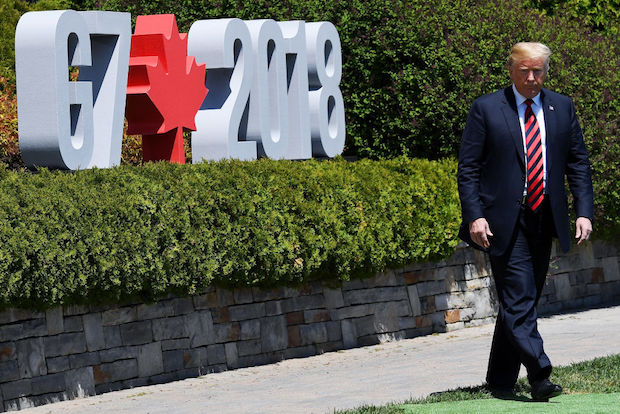Some say that Mr Trump’s behaviour at the G7 meeting last week-end showed contempt for the international rules-based system that many people in financial markets and the media admire. It is true that Mr Trump complained Russia was not present, inserted special prose about his energy and tariff policies and decided he did not agree with the communique after it had been issued. He showed he thought going off to his bilateral meeting with the North Korean dictator was more important than the very general conclusions of the G7 summit. The G7 official statement ranged widely over world economies and affairs but lacks clout if the USA does not agree with it.
The summit conclusions began with a paean of praise for ‘a rule-based international order’, whilst the USA is imposing tariffs on grounds of national security and breaking the rules of diplomacy.
The West is right to insist on rules-based markets. The reason the US and European share and bond markets are so large and successful is based on their offer of security for an investor’s money. People like transparent transactions, with plenty of liquidity, honest dealing and an ability to see what is happening. It does not mean, however, that everyone and every country in the world agrees with the wider and extended belief of the West in a world rules based economic and political system. Nor does it mean that the investments you can buy and sell follow simple rules over what happens to their value.
Some commentators and analysts make mistakes because they assume that people and forces like Mr Trump must be negative for markets because he seeks to challenge or disrupt some of the settled features of the rules-based system. Instead, since he became President US share markets have performed very well. We need to understand why this should be so.
If you are a lawyer or accountant or investment professional sitting in New York or London it is easy to think the entire range of the current western rules-based system is right. Many such people support the World Trade Organisation rules for world trade, the Euro rules for continental economic management, the NATO view of how international power politics should be policed and the general views of the UN, IMF and other world bodies on everything from climate change to gender equality and healthcare. To try to understand markets you also need to understand the people, countries and forces which challenge these arrangements. They invest and deal as well.
China and Russia certainly do not agree with the NATO view of the world of international politics and are often on a different side in conflicts like those in the Middle East. Many continental European voters disagree with the disciplines of the Euro scheme and wish to see more public spending and less taxation, because the scheme does not deliver them a job or a decent income. People in the Middle East do not agree with some of the military interventions of NATO or western military coalitions. China does not always play by the western rules of intellectual property. Not everyone agrees with the UN led approach to the environment. There are frequent challenges to the so called western rules-based system, and plenty of places that secure opt outs from features of the institutional architecture.
Mr Trump does not think the system he inherited works that well for many of the Americans who elected him. That is why he is seeking to change the approach of the World Trade Organisation, seeking fairer trade from the US point of view, not just WTO approved trade regulation. His imposition of selective tariffs is designed to produce a positive response from other leading members of the WTO to reduce the barriers against US products. The Italian government is about to challenge the orthodoxies of the Euro scheme, as many of their voters are frustrated by the lack of growth and high unemployment that have characterised the last decade. It is also challenging the present EU policy on migrants coming by sea.
There are no rules that say every challenge to an orthodoxy is bearish, and every success for an orthodoxy is bullish. Whilst strong markets need well enforced rules of trading, there are no rules over what sends an asset higher. Sometimes the people in markets who like Mr Trump or dislike the wider rules-based system will have their say with their money. Investors need to assess whether sometimes their demand for reforms might help the world economy and therefore push asset prices up. That has become the conventional wisdom over the US tax cuts and deregulations which have come from the Trump Presidency. The G7 Communique is full of well-intentioned statements, but without full US engagement many of them will remain as just wishes.
John Redwood is chief global strategist at Charles Stanley






Comments